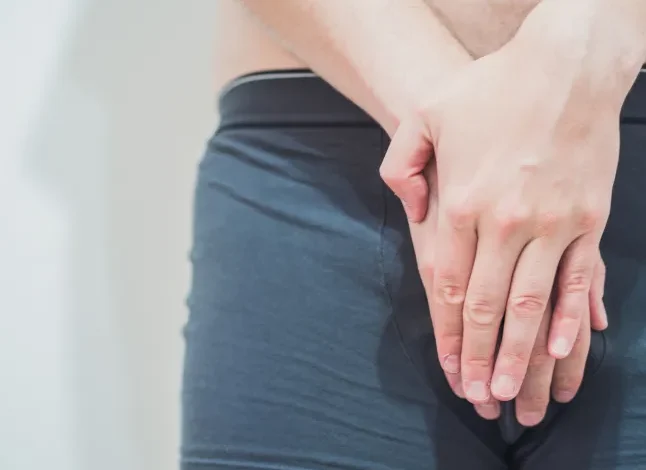This is the exact amount of semen you should produce each time you finish

The big O. The climax. The explosive finale. For men, this almost always involves ejaculation.
But guys, have you ever wondered how much semen you’re actually meant to produce when you orgasm?
It’s a question that’s been raised countless times on the Reddit r/sex forum, usually by men who are worried about their emissions.
‘I’m pretty concerned that I produce an abnormally minimal amount of cum,’ wrote one young man. ‘We’re talking 0.5 to 2ml — less than a teaspoon.
Even when I “save up” for a week or more there’s still barely anything.’
Another, Dan*, 29, wrote: ‘I usually cum quite a bit in terms of volume. But recently I’ve noticed that barely anything comes out of my d**k when I ejaculate — just a few drops.’
So, is there such a thing as a ‘typical’ load? We’ve enlisted the help of sexual health nurse, Sarah Mulindwa, to give us the long and short of it.

Semen
How much semen should a man produce?
While it’s certainly not one size fits all, there is a general range that’s considered typical when it comes to how much semen a man should produce.
‘Most men ejaculate between about 2ml and 5 ml per orgasm, which is roughly half a teaspoon to a full teaspoon,’ Sarah tells Metro.
‘Anything consistently below 1.5ml to 2ml is usually classed as low volume, while more than 5ml isn’t harmful but isn’t especially common either.’
It’s a good guideline but if you want to get more specific, we’ve broken it down by age, too.
‘A healthy man in his 20s will usually produce somewhere around 2.5ml to 4ml, which is about a teaspoon,’ Sarah, Lovehoney’s sexual health nurse, adds.
‘In your thirties, it’s often similar, though some men notice very slight decreases. By your fifties, volume can drop a little due to hormonal changes, but it shouldn’t suddenly fall to just a few drops — many men still produce 2ml to 3ml quite comfortably.’
Critically low semen volume is known as hypospermia, which Sarah adds is defined as under 1.5ml per ejaculation over weeks or months.
You need to replenish
Basically, your body needs time to ‘refill its tank’, as it were.
If you ejaculate multiple times in a short window, each load will usually be smaller than the last, the sexual health nurse explains.
‘The seminal vesicles and prostate simply haven’t had time to replenish fluids yet,’ Sarah says. ‘Post ejaculation the volume usually returns to baseline after 24 to 48 hours.
‘Abstinence length matters more than people realise — even one or two extra days between ejaculations can noticeably increase volume, which is why lab semen samples are usually collected after two to seven days of abstinence.’
What affects the amount of semen you make?
There’s a whole load (sorry) of things that influence how much semen you produce each time. The biggest is hydration.
‘Semen is mostly water, so if you’re dehydrated, your body simply has less fluid available to work with,’ Sarah explains.
Hormone levels, particularly testosterone, also play a big role, because low levels can affect the force with which you ejaculate, as well as the volume.
Volume is also impacted by prostate and seminal vesicle health. Vesicles are fluid filled sacs which move substances into or out of a cell, and if these are inflamed, blocked or not functioning properly, your volume will drop.
What does semen contain?
‘Healthy semen isn’t just sperm,’ Sarah says. ‘It’s mostly a nourishing fluid designed to protect and transport sperm. It contains: sperm cells, water, fructose for energy, proteins and enzymes, zinc and minerals, prostate fluid and seminal vesicle secretions.
‘It’s also worth noting that healthy ejaculate is usually whitish, slightly thick, and liquefies after a few minutes.’
When it comes to lifestyle factors, Sarah explains certain medications can interfere with the volume, like antidepressants, blood pressure meds, prostate drugs and hormone treatments, so always tell your doctor if you notice a drop in semen volume after taking a new medication.
Stress raises your cortisol levels which can suppress your testosterone and disrupt sexual responses like ejaculation, and fatigue will also hinder semen production.
‘Your ejaculate is one of the body’s quiet ways of telling you how things are going under the hood,’ she explains. ‘But a person can have low-volume ejaculate and a perfectly healthy sperm count and motility, and vice versa.’
However, if you want to increase your semen volume there are a few things you can do.
‘Because semen is fluid and hormone-driven, daily habits make a difference,’ Sarah explains. ‘Drinking enough water, spacing out ejaculations, sleeping well and managing stress all help maintain normal volume.
‘Reducing alcohol and smoking, exercising regularly and eating zinc-rich foods can also support healthy semen production over time.’

I drew my own opinion of the office wearing these parasites or in your fate and
I love it when individuals get together and share opinions.
Great blog, continue the good work!
Thank you so much @ Get started, I appreciate
Weird!!!